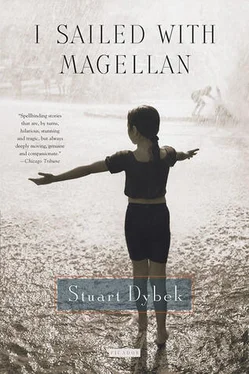I sailed with Magellan, ooo-ooo-ooo
Oh, oh, oh,
I sailed with Magellan …
Each time Mick sang it, the song got weirder, rambling without any one melody, its scale sounding foreign like a Muslim prayer, Mick never pausing, even if I laughed, he’d just keep singsonging on into a kind of trance … I sailed with Magellan, oh, oh, oh … boiled our shoes … ate our sails … without teeth … chewed our ship down to the nails … I sailed with Magellan, ooo-ooo-ooo
Oh, oh, oh …
It kept getting softer and softer until finally he faded out. I could hear his breathing heavy and rhythmic and knew he was sleeping. The light across the gangway went out, leaving the room a shade darker. After a while, when the dog felt it was safe to softly whimper, I knew Kashka and Jano were sleeping, too.
Swimsuits on beneath our clothes, a towel each, and the bar of brown laundry soap Sir always brought, we rumbled out of the neighborhood in his latest bargain, a Kaiser the green of an army tank — one that had seen combat. At Twenty-third, Mick and I shouted for him to swing onto the flooded side street where a plank propped before an open hydrant made for an illegal fountain, but he ignored us, and we headed down Cermak, stop and go, never fast enough to make a breeze, past the lumberyards on Ashland, and the huge electric plant where Moms used to work, and the turnoff to Maxwell Street, then through Chinatown, with its crowded streets and pagodaed restaurants where it was rumored illegal fireworks were sold.
“Full of tourists.” Sir said. “Only place in Chicago where you see tourists.”
“Why don’t we ever stop and look around Chinatown?” Mick asked.
Sir just gave him a raised brow.
After Chinatown the street turned shabby, trash in the gutters, factories and gutted apartment buildings side by side. Black people sat on the doorsteps, escaping the heat.
“Roll up the windows,” Sir said. “Hot nights like this anything can happen around here.”
We rolled them partway, but it was too stuffy. It had been in the nineties all week. The State Street El station looked as if it were silhouetted against the radiation from an atomic blast. The platform’s shadow stretched in perfect detail, like an enormous negative superimposed on the street. Beneath its shady girders was a bar, its open door like an amplifier reverbing blues guitar. Black men sweating through their shirts and women in silky, sleeveless dresses congregated in front, foaming beer bottles in hand. They laughed and swayed, and the women fanned themselves to the music. They looked as if they were having a good time. We stopped for the light under the slatted shadows of the El tracks.
“Lookit! Lookit!” Sir yelled. “The guy with the chicken!”
“Where at?” Mick whirled in the backseat. He’d only heard about the Chickenman till now.
A bony, brown man, legs like stilts, shirt out over his trousers, strutted down State, nodding left and right as if the street were lined with people watching a parade. A white chicken perched at attention on his head. He passed the bar and stopped at the curb. The chicken stepped from his head to his shoulder, ruffled its feathers, and white droppings hit the sidewalk. Then it gently twisted its neck and rubbed its faded pink comb along the man’s cheek.
The light changed. Sir stepped on the gas. The Chickenman blew us a kiss. I could see black kids running to catch up with him and wished I could follow him, too.
“He goes all over the city with that chicken,” Sir said. “Perry and I see him sometimes at Maxwell Street, right sonnyboy?”
“About every Sunday,” I said. For the last year, since I turned thirteen, Sir had been taking me along to Maxwell, an open-air bazaar that some people called Jewtown. He said he wanted to teach me how to shop. I didn’t want to go at first, until I realized the big shopping day on Maxwell was Sunday morning, and that going with Sir got me out of going to church.
“Maxwell Street is your father’s church,” Moms would kid.
Mick, still too young for Jewtown, was stuck going to Sunday mass.
“That Chickenman had that chicken pecking corn right off his tongue,” Sir told Mick. “Poor crazy goof.”
I remembered a Sunday in spring when we’d seen the Chickenman close his mouth over the head of the chicken as if preparing to swallow it whole. The chicken didn’t seem to mind. That was on Maxwell Street amidst crowds of people browsing and heatedly bargaining in different languages. Sir led me from one rickety stall to another, stopping to pick through boxes of used faucets, lengths of pipe, elbow joints, fittings heaped in musty, tangled piles on canvas tarpaulins lining the curbs. As usual, he was looking for some specific part — a three-quarter fitting — and, as usual, I was supposed to be helping him find it, though I had no idea what a three-quarter fitting was.
His ability to gauge instantly the dimensions of things both mystified and intimidated me. It was a gift I seemed to lack completely, one expressed in a language I was ignorant of, with a vocabulary one needed to gain admittance into the practical world of men. We might be rumbling in the Kaiser down a busy street like Western Avenue, and Sir would suddenly hit the brakes and stop in the middle of traffic before a piece of scrap that other cars swerved to avoid. While Mick and I slouched in humiliation below the dash, Sir would get out of the car, pick up the scrap, and singing aloud, wholly oblivious to the motorists honking and cursing as they pulled around him, he’d carefully fasten it to the homemade carriers he’d suction-cupped to the roof. He carried rope in case of such lucky finds, though in the absence of rope, twists of wire coat hangers served just as well. A coat hanger fastened the tailpipe to the Kaiser, and we’d gone through a phase when coat hangers held the screen door to its hinges, secured the lids of trash cans, and appeared in a variety of other ingenious applications. Mick had remarked that he expected Sir to start using coat hangers as belts for our trousers and laces for our shoes. When — still singing — Sir got back in the car, we’d ask: “Yo, Dad, don’t you think the Kaiser is junky enough without stopping to pile more junk on top?”
He always had the perfect comeback. “Do either of you guys know what a good two-by-four is going for by the foot?”
Not only did I not know the price per foot but I didn’t know how by looking at a piece of busted lumber he could recognize its dimensions.
That Sunday on Maxwell Street, back in spring, it was a three-quarter fitting we were after, and I especially hated sorting through used plumbing. I couldn’t help imagining the flood of excrement that had flushed through those moldy gray parts. I was lagging behind, thumbing through a carton stuffed with old comic books, when a gypsy girl came out of one of the storefronts on Maxwell and slipped an arm around my father’s waist. Her earrings dangled nearly to her bare shoulders. Her peasant blouse scooped across the crease between her smallish, pointy breasts. A red scarf bandannaed her black hair, and her eyes were violet with mascara. Beneath the makeup, she didn’t look that much older than me.
“You got black hair like gypsy,” she said to Sir. “Want gypsy good time? I give you.”
Sir took off walking, shaking her arm off, trying to ignore her. Suddenly, he slapped his wallet, pinning her hand to his back pocket. “Let go,” he said.
Instead, she reached a hand around and grabbed his crotch and, still smiling, stared up at him, whispering something I couldn’t hear. It stopped him in his tracks.
“Da-dammit,” he said, screwing up his face as if he’d swallowed something sour, then shot a harried look back at me, a look I interpreted as Don’t tell Mother.
Читать дальше












